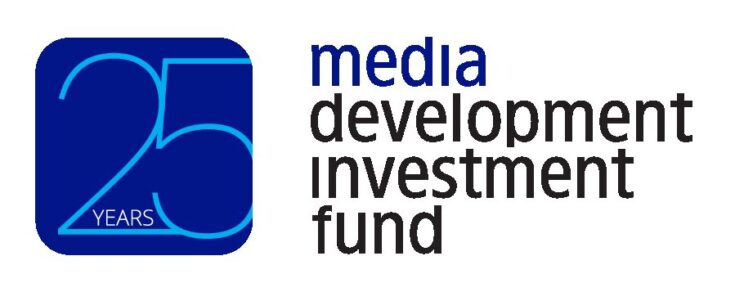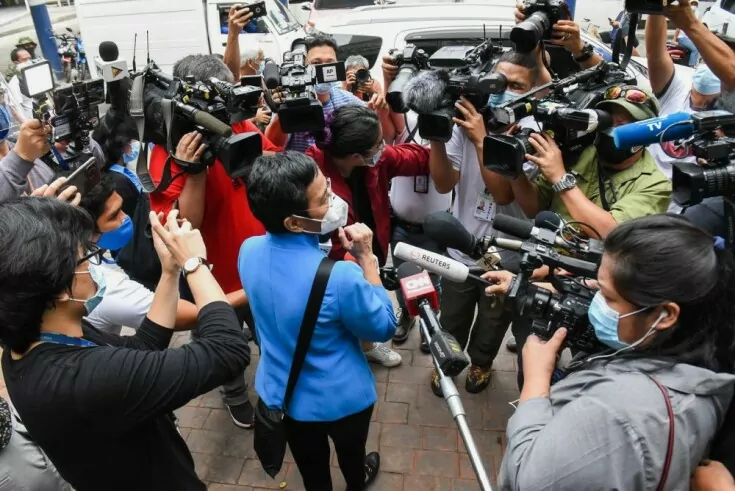By Magdalena Skrzypek, Impact and Communications Manager.
World Press Freedom Day is a time to reflect on the enormous value free media contributes to open and free societies, and how we all must play our part in defending independent journalism. The public health emergency of the Covid-19 pandemic has brought this into sharp focus, as the challenges facing press freedom have assumed new dimensions.
MDIF’s 25 years of experience show us that press freedom is not immune to setbacks and can never be taken for granted. Just like Covid-19, any gains can be easily and quickly reversed, and thus need to be consistently defended.
Our mission reflects an abiding commitment to a free press, a key democratic value with well-documented and a wide-ranging impact on multiple fronts, from corruption levels to economic prosperity. By design we invest in countries where press freedom is limited and under threat, be it from political interference and media capture or harassment and physical attacks on media workers. Since MDIF first started to provide affordable capital to independent news companies in 1996, we have worked in 44 countries scattered around the globe – from Slovakia to Lesotho and from Peru to Malaysia – investing in well over 100 independent media businesses of different sizes, types of activity and business models.
A vital part of our investment strategy is offering patient capital that dares to go beyond press freedom trends. We build long-term relationships with media businesses we invest in that last on average seven years, with some of them going back to as many as 20 years, and some of the companies returning to our portfolio after many years, as new needs arise.
Over 25 years, we have closely followed countries in various stages of transition. Sadly, it has become painfully apparent that for every success story, there is also a failure. In two and a half decades, we have witnessed countless instances where initial optimism for greater media freedom was short-lived and followed by backsliding.
Threats to media freedom come from different directions: regimes cling to power with white-knuckled resolve, entrenching their repressive rule; newly elected leaders fail to implement reforms or use their consolidated power to roll back political rights and civil liberties. These setbacks take place at a varying pace, sometimes slower, sometimes quicker and often there are twists and turns along the way.
But if a government is determined to roll back gains in press freedom, the international community is limited in what it can do to dissuade them, particularly at a time such as now when so many leaders see the press as an unwelcome check on their powers and, emboldened by the emergency, use the pandemic as cover to muzzle independent media. Just as Maria Ressa, the founder of Philippines’ Rappler, a media company we work closely with, wrote: “Now more than ever, facts matter. Truth matters. Checks and balances matter.”
The evidence is powerful and has been validated by numerous press freedom and democracy monitors. Take the World Press Freedom Index published by Reporters Without Borders that rates press freedom in 180 countries and territories each year. According to their recently published report, independent journalism, “the best vaccine against the virus of disinformation, is totally blocked or seriously impeded” in 73% of the countries ranked. Among these are many that, after a spectacular rise in press freedom, have been on a downward trajectory.
One of them is Poland. In 2015, the country reached its highest ever position of 18th within the ranking. But after the Law and Justice (PiS) government came to power that year, it started showing a decline in each of the consecutive years, falling a staggering 46 places to its lowest ever position of 64th in 2021, directly below Malawi (62nd) and Armenia (63rd). The steep drop has troubling real-world implications. For instance, in the same time span of six years, 63 criminal and civil cases were brought against our investee Agora and its newspaper Gazeta Wyborcza by the ruling party and its allies for its reporting on issues of public interest, such as a lawsuit filed by a state-owned company over Wyborcza’s investigation into the purchase of face masks with fake certification. During the pandemic, a number of the newspaper’s journalists and photojournalists also faced dubious criminal charges for allegedly breaching lockdown rules.
Another example is Malaysia, the country that fell the furthest in 2021, down 18 positions in one year to number 119, just above Nigeria (120th) and Nicaragua (121th). Here we have been working with Malaysiakini, a leading online source for independent news, for many years, with a first investment dating back to 2002. For two decades, the pioneering website has tirelessly shone the light of truth on Malaysia’s shady politics, paving the way for the momentous democratic transition during the historic 2018 elections. When the ruling party was unseated for the first time in 61 years, the hopes that conditions for media freedom in the country would improve were high. But all this has gone into reverse, after a short-lived “democracy period” gave way to a renewed clampdown on press freedom, including a recent criminal prosecution of Malaysiakini and a much-criticised draconian emergency ordinance under the guise of tackling Covid-19 misinformation.
Experiences from those two countries and many similar examples across different regions have taught us that wins for press freedom should be celebrated with caution.
According to Freedom House, “media freedom can recover much more quickly after a period of authoritarian governance than some other elements of democracy, such as the rule of law, but it is also subject to rapid reversals”. This brings about the somewhat bleak realisation that, “like democracy itself, press freedom is not an end state that remains secure once it is achieved – It must be nurtured and defended against the forces that oppose it,” as their report “Freedom and the Media: A Downward Spiral” says.
What does MDIF do in light of this?
While we acknowledge that the press freedom environment is of course among key areas that impact the functioning of media businesses, at its core, MDIF focuses its work on the media viability of individual media organisations, rather than trying to influence unpredictable and volatile environments in which they operate, a task that is admirably undertaken by other organisations.
To increase the prospects for the sustainability of the media sector in a given country, we run capacity strengthening programs, including South Africa Media Innovation Program (SAMIP) and Protecting Independent Media for Effective Development (PRIMED) in Ethiopia, which aim to improve the business and management capacity of participating media through long-term mentoring, technical assistance and strategic advice.
Yet, our core activity is providing loans and equity to independent media organisations, work that MDIF has been doing for the past quarter century. Our affordable financing supported by tailored technical assistance aims to help independent media companies develop strong and sustainable businesses, making them less vulnerable to media capture and capable to withstand or adapt to shocks and stresses. The close alignment of MDIF and client interests in building viability fosters lasting relationships.
Let’s take MDIF’s first ever investment in 1996 to Petit Press, the first politically independent printhouse in Slovakia. With our loans, the publisher built two print shops that played a key role not only in its operation but also for other publications in the region. Last month, 25 years later, we purchased a 34% minority stake in Petit Press, now also a leading digital player. “I am very happy the new shareholder of our company is MDIF because I have been following their work for over 20 years. The main goal of MDIF has always been defending the independence and freedom of media,” Alexej Fulmek, CEO of Petit Press emphasized in the deal announcement.
MDIF takes “a long view on both media companies and democracy”. It provides support as changes — both positive and negative – occur in the countries where the media we support work, guided by the belief that stronger media companies will be less susceptible to negative developments, including those in press freedom.
Just like with Covid-19, patience and resilience is key on a long road ahead, but small steps eventually walk miles and we are confident that we are on the right path.

This article is part of our series, ‘25 things we’ve learned’, marking MDIF’s 25th anniversary.
